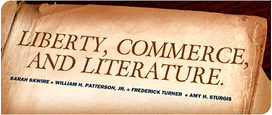Amy Sturgis’s essay pushed several buttons for me, and David Brin’s post “Do Sci Fi Attitudes Reflect Our Times?” dovetails neatly with the conclusion of her essay: science fiction certainly does reflect the world it is created in. In fact you can make a strong argument that science fiction has always gained its relevance from the fact that it addresses its world of experience through the lens of Otherness — if it weren’t addressing the world we all experience, it wouldn’t be interesting or entertaining at all.
But it is noteworthy that, like the real world it is embedded in, science fiction is also going through an Endarkment, so I hesitate to draw the same degree of comfort from it. I enjoy Lois McMaster Bujold’s books as much as the next skiffy reader, but they are the mainstream of what is essentially a dead genre that has been defined by her (and lest this be taken as a criticism of Bujold in particular, I have to say that the best recent example of skiffy endarkment is John Scalzi’s extraordinarily dumbed-down reboot of H. Beam Piper’s Fuzzy series).
Because of the market conditions that surround genre publishing of all kinds, all genres that have a bit more than pure “stroking” to them — which certainly goes for the mystery as well as science fiction genres — struggle with the two uses to which art can be put: to soothe and lull, gratify and affirm the reader’s values — or else to challenge and energize. Note that I did not say “two kinds of genre fiction”: this is what can be done with art, not the essential nature of the art itself; art that is complex, multi-layered and so forth — in short, art that has the same kind of values we associate with “literature” — helps the reader along more than the simpler kind. But even quite minor art, as Dorothy Sayers pointed out, can have its edifying uses, if that sort of thing is of interest.
Science fiction in its revolutionary mode creates models of change-aspects of the real world. Theorists of science fiction prattle about how sf rises out of the birth of modern science, and I politely snort in that general direction. Modern science had been around for more than 150 years before science fiction came about. Heck, even future–scene setting didn’t come about as a literary invention until 1750 or so. What did take place just before modern science fiction came about (conventionally 1818) was the American and then French Revolution, the most tumultuous and shocking and fearful social upheaval of all known history. (OK, I’ll give you the invasion of the Golden Horde if you wish). That mad excess of rationality, in which social institutions were turned upside down and overnight, and the map of Europe deregled within less than a decade, was the incitement for science fiction: a new tool was needed to think about that particular unthinkable.
And that is what science fiction does.
Art that is not revolutionary is deadening.

